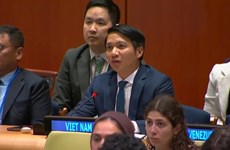NA moves on IZ pollution
The National Assembly Standing Committee on Sept. 29 spoke about ways of
stopping growing environmental pollution in economic zones and craft
villages.
The National Assembly Standing Committee on Sept. 29 spoke about ways of
stopping growing environmental pollution in economic zones and craft
villages.
The discussions on pollution followed a report by the supervising board of the Standing Committee. It was presented by the Chairman of the Committee for Science, Technology and Environment, Phan Xuan Dung.
Dung said the committee had conducted field trips to 15 coastal economic zones and 54 traditional craft villages and found they had contributed remarkably to socio-economic development by creating jobs, increasing people's incomes - and the State budget.
However, he said members agreed that this development is posing a threat to the environment.
Dung said most localities focus on investment, but are reckless about environmental protection. Despite the large number of economic zones and craft villages, most lack staff who specialised in protecting the environment and the laws governing this area.
Slack cooperation among State agencies has also contributed to the inefficient management and the State itself was only setting one percent of budget spending aside for environmental protection, which is not enough.
Chairman of the Finance and Budget Committee, Phung Quoc Hien, said that due to unclear and overlapping regulations on the powers of each authority, they often "pass the buck" to each other.
Hien said budget collections from environmental-protection fees are often insufficient to repair the pollution and damage created by those breaking the law.
Deputy Minister of Science and Technology, Nghiem Vu Khai, said production in craft villages is on a small-scale and involves many risks, such as unstable sources of materials and training workers.
The income of village craftsmen is low, therefore they do not have sufficient capital to invest in technology or to spend on protecting the environment, Khai said.
Chairman of the Committee for External Affairs Tran Van Hang said budget spending on environmental protection should be increased as the treatment of industrial waste is often costly.
He said many companies are prepared to pay fines rather than invest in waste-treatment technology as fine levels are low.
Hang suggested strict punishment should be enforced, including shutting down factories when they violated the law.
Deputies agreed that environmental protection measures at the zones and villages should be regularly inspected by NA agencies, the Government and local authorities.
They also agreed it is necessary to call for private investment in environmental protection.
Three steps were outlined to stop pollution in IZs and craft villages. These were to strengthen the management of central and local authorities, increase State investment, and enforce punishment for those who broke environmental laws.
Chairman of the Law Committee, Phan Trung Ly, asked the supervising board to make a deeper analysis on implementing policies and laws on environmental protection before the report is submitted to the NA./.
The discussions on pollution followed a report by the supervising board of the Standing Committee. It was presented by the Chairman of the Committee for Science, Technology and Environment, Phan Xuan Dung.
Dung said the committee had conducted field trips to 15 coastal economic zones and 54 traditional craft villages and found they had contributed remarkably to socio-economic development by creating jobs, increasing people's incomes - and the State budget.
However, he said members agreed that this development is posing a threat to the environment.
Dung said most localities focus on investment, but are reckless about environmental protection. Despite the large number of economic zones and craft villages, most lack staff who specialised in protecting the environment and the laws governing this area.
Slack cooperation among State agencies has also contributed to the inefficient management and the State itself was only setting one percent of budget spending aside for environmental protection, which is not enough.
Chairman of the Finance and Budget Committee, Phung Quoc Hien, said that due to unclear and overlapping regulations on the powers of each authority, they often "pass the buck" to each other.
Hien said budget collections from environmental-protection fees are often insufficient to repair the pollution and damage created by those breaking the law.
Deputy Minister of Science and Technology, Nghiem Vu Khai, said production in craft villages is on a small-scale and involves many risks, such as unstable sources of materials and training workers.
The income of village craftsmen is low, therefore they do not have sufficient capital to invest in technology or to spend on protecting the environment, Khai said.
Chairman of the Committee for External Affairs Tran Van Hang said budget spending on environmental protection should be increased as the treatment of industrial waste is often costly.
He said many companies are prepared to pay fines rather than invest in waste-treatment technology as fine levels are low.
Hang suggested strict punishment should be enforced, including shutting down factories when they violated the law.
Deputies agreed that environmental protection measures at the zones and villages should be regularly inspected by NA agencies, the Government and local authorities.
They also agreed it is necessary to call for private investment in environmental protection.
Three steps were outlined to stop pollution in IZs and craft villages. These were to strengthen the management of central and local authorities, increase State investment, and enforce punishment for those who broke environmental laws.
Chairman of the Law Committee, Phan Trung Ly, asked the supervising board to make a deeper analysis on implementing policies and laws on environmental protection before the report is submitted to the NA./.













